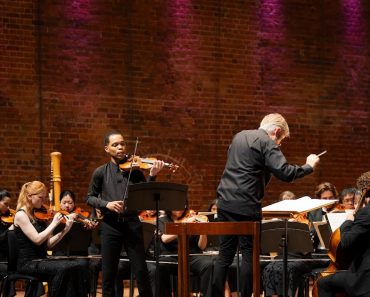By Andrew Hamlin
NORTHWEST ASIAN WEEKLY
 The manuscript, a testimony of a young Japanese man’s journey to America, lay largely forgotten for decades. But just recently, the immigrant’s grandson turned his grandfather’s words into a set of startling, vibrant music.
The manuscript, a testimony of a young Japanese man’s journey to America, lay largely forgotten for decades. But just recently, the immigrant’s grandson turned his grandfather’s words into a set of startling, vibrant music.
Juhei Caleb Kono arrived in Tacoma from Japan in 1911, aged 13. He spent his early life working with his family, on a leased farm in Fife.
Kono self-published his own memoir in Japanese, but his daughter, Seattle-based calligrapher Midori Kono Thiel, prepared a translation of the first chapter, hoping to share her father’s experiences with family members who didn’t speak Japanese.
According to jazz musician Ben Kono, Juhei Kono’s grandson, his aunt Midori felt that the first chapter “would be most meaningful for us as he explains the family situation in Japan at the end of the 19th century, why it was necessary for him to immigrate to the U.S., and what it was like for a young Japanese boy on his own in America around the turn of the century.”
Midori Kono Thiel’s own son, retired filmmaker and marketing executive Kenji Thielstrom, remembered his own family’s life in Seattle, where his father, Philip Thiel, taught architecture at the University of Washington.
“My sisters, Tamiko and Kiko, and I grew up in the University District of North Seattle from about 1960-1980,” said Thielstrom, “attending University Heights Elementary School, John Marshall Junior High School, and Roosevelt High School. I also attended the University of Washington for three years before transferring to USC in Los Angeles, while Tamiko went to Stanford and MIT, and Kiko went to Yale.”
Thielstrom’s cousin, Ben Kono, was born in New Orleans to his Japanese father and English-immigrant mother, but grew up in Vermont.
Recalled Kono, “My parents had a small but eclectic record collection that was in constant rotation: the Beatles; Simon and Garfunkel; traditional Greek dance music; Beethoven string
quartets; ‘Godspell.’”
“But there were two records—the Cleveland Orchestra’s recording of Mussorgsky’s ‘Pictures at an Exhibition’ and Peter, Paul, and Mary’s ‘Puff the Magic Dragon,’ that really captured my imagination. Those two records had a real emotional impact on me and showed me the storytelling power of music, both with words and without. ‘Pictures’ in particular had a lasting influence on the way I hear orchestration carrying a narrative throughout a work.”
Reading his grandfather’s experiences set off several reactions in Kono.
“What struck me most about my ojichan’s (grandfather’s) immigration story was how much work he did to stay in this country and how many obstacles there were to staying here, including lots of racism towards the Japanese. It was interesting to see a certain kind of humor in his recounting, which is not something I remember [about him] as a child.
“It’s also interesting how the weight of this story has changed just over the last 10 years as we’ve seen not only an uptick in hate crimes against Asians fueled by the COVID-19 pandemic, but also the resurrection of the Alien Enemies Act, which was last used to intern Japanese American citizens during WWII, stripping them of all their rights and freedom. There are eerie parallels between his story and those of today’s immigrants seeking a better life.”
Ben Kono, who plays several woodwind instruments, masterminded the music from nine players total, on his album “Voyages.” The influence of both grandparents—Juhei Caleb Kono and his wife, Hisako Nara Kono—pervades throughout, and the album climaxes with a multi-segmented “Generations Suite,” with movements labeled “Issei,” “Nisei,” “Sansei,” and “Yonsei.”
As Ben Kono explained, “The four-part suite is not directly inspired by life events, but serves to commemorate the four generations of our family that have lived in this country. Juhei mentions the memory of temple bells that were a constant presence in his childhood in Japan, and that serves as a musical connector between the four movements of the suite. The central theme that is present in each movement is altered with each subsequent ‘generation’ to reflect the changing times, but always returns to its original state.”
Kenji Thielstrom did not hear “Voyages” until after his cousin had finished and released it, but gives his approval. “I thought it was a terrific musical interpretation of the nuances and emotional states that each of the Japanese American generations have experienced, each of which has been very different from the others.”
Concludes Ben Kono, “My grandfather’s story is at once unique and universal among those who have immigrated to this country. My intent with this project was to honor my forebears and
create a story with music.
“While I hope that the story resonates in some way with the listener, my main goal is to take the listener on some kind of journey that ends with an emotional takeaway.”









